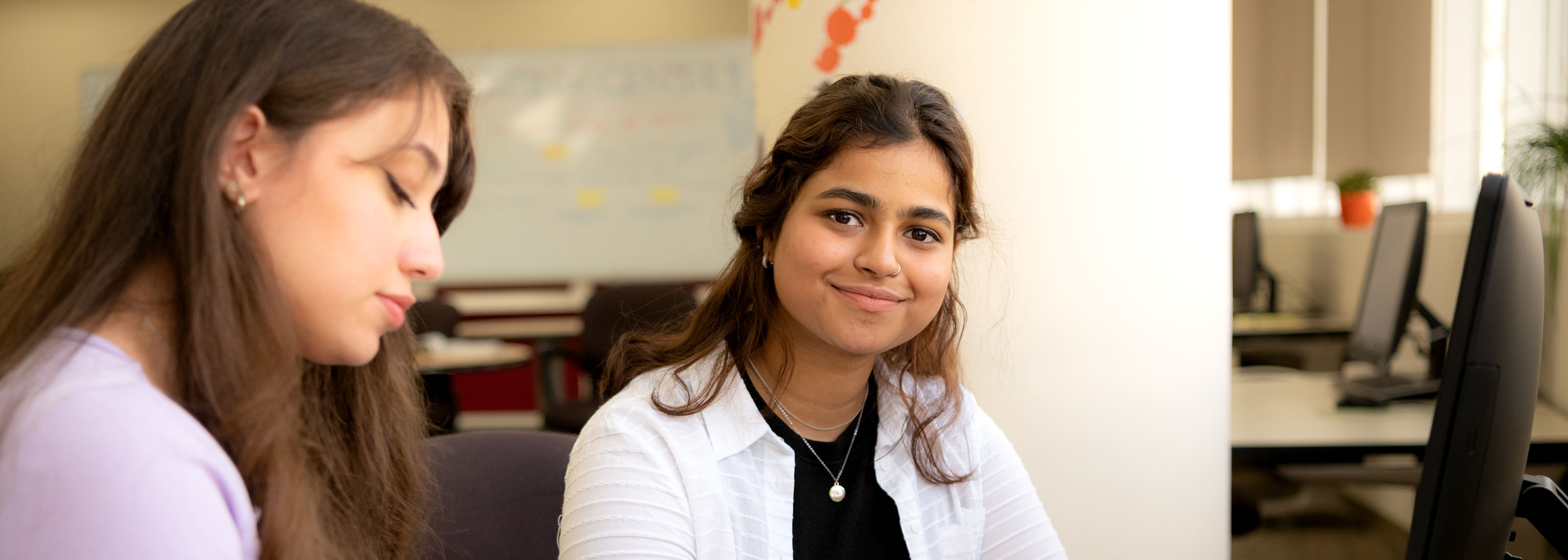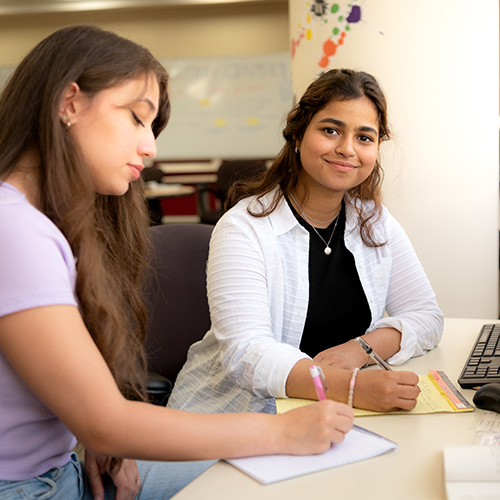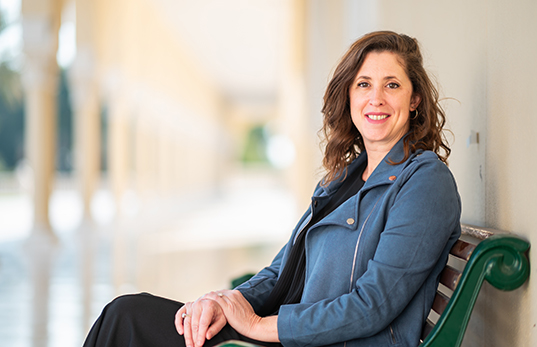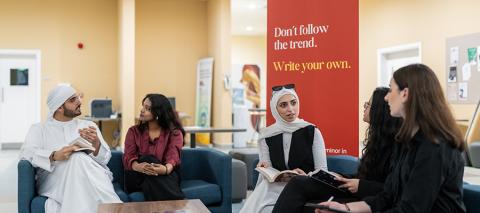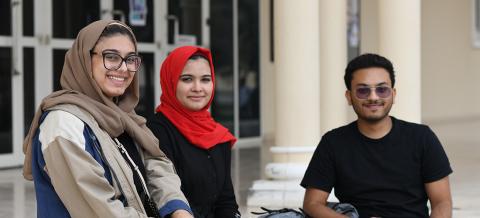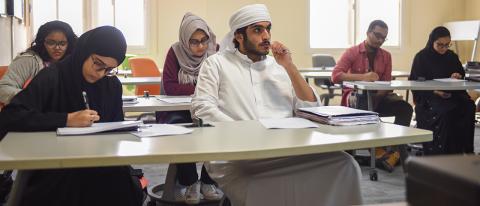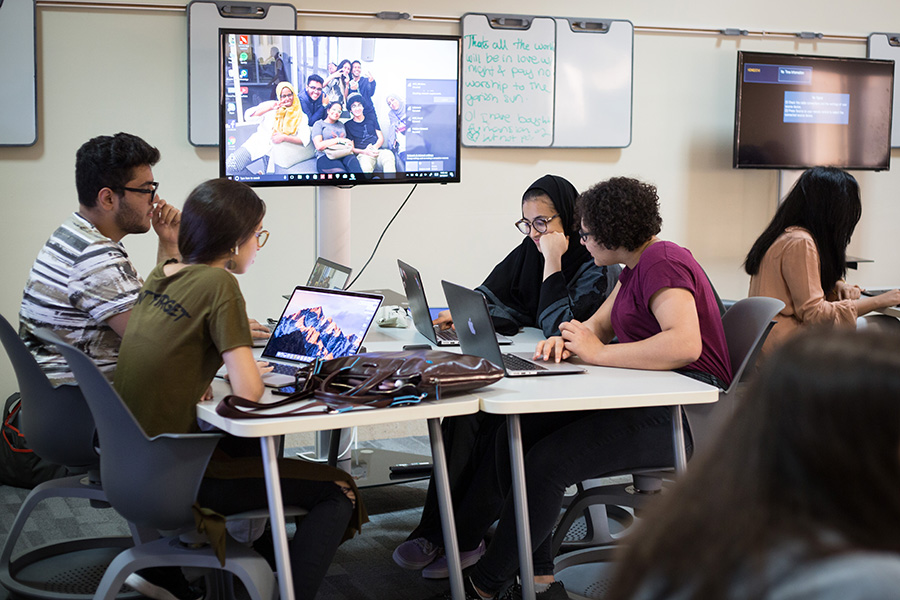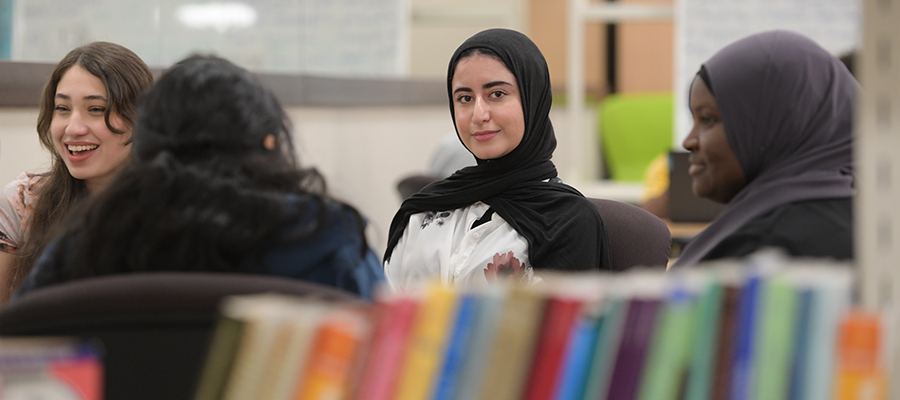Head Of Department
Programs
Featured Courses
Explore a sample of our recent courses below:
- ENG 194 Technologies of Text
Taught by Dr. Kristen Highland
From ancient cuneiform to Gutenberg’s printing press to today’s AI text generators, technologies of writing and reading have shaped our world and our understanding of it. These technologies influence how we communicate with each other, how we tell stories and share information, and even how we think. This course examines the long history and potential futures of innovation in reading and writing technologies. In this class, we will explore and experiment with diverse text technologies and critically reflect on our own practices in this historical moment of technological change.
- ENG 210 Introduction to Literature
Taught by Dr. Brian McAllister
This course offers an introduction to literature in its many forms. We’ll explore a range of literary texts that employ a variety of genres within an array of historical and cultural contexts—from lyric poetry to dramatic narrative, from science fiction to nature writing, from Renaissance England to contemporary Abu Dhabi. Through these texts and our engagement with them, we’ll consider not just how literature constructs and gives us access to multiform worlds, but also how those literary worlds can reflect upon, complicate and enrich our engagement with the world around us.
- ENG 223 Introduction to Language Study
Taught by Dr. Adnan Ajšić
Language, as Steven Pinker has noted, is one of the wonders of the natural world. We all use it, we use it nearly all the time, and we can express almost anything, existing or imagined, in it. Perhaps most importantly, language is a uniquely human tool for understanding the world, and the production and transmission of knowledge between individuals and groups, as well as between generations. But where does this fascinating ability that distinguishes us from all other living things come from? How does it work? How and what do we use it for in our modern world and how does it intersect with technology? Join us in ENG 223: Introduction to Language Study as we explore the origins of language(s), language structure (sounds, words, sentences, meaning), language evolution and change, and the link(s) between language and our societies and cultures.
- ENG 250: World Literature
Taught by Dr. Maya Aghasi
This spring, we travel not only in space but in time in ENG 250: World Literature. We will read some of the oldest texts we have in existence to explore what it means to be a god/goddess, hero/heroine, human. On our journey, we will meet the likes of Gilgamesh, Achilles and Hector, Odysseus, and Genji, but also Scheherazade, Don Quijote, and Sancho Panza (because we all need some fun in our lives!). In the final portion of the semester, we will see how contemporary artists and writers reread these masterpieces and discuss how they continue to resonate with us today.
In terms of workload, expect lots of exciting reading, discussion-based classes, weekly responses, a presentation, short essays, and a final paper. Also expect a creative assignment in which you contribute your own modern adaptation of one of these classics.
- ENG 326 Development of the English Language
Taught by Dr. Khawlah Ahmed
You speak the English language, but do you know how that language came about and what are its origins? What languages (and even cultures) played a role in its development? These, and many other interesting information and facts about the English language, are addressed in ENG 326 (Development of the English Language), a course that traces the development of the English language from its Indo-European roots to the present day.
- ENG 334 Meaning in Language
Taught by Dr. Ji Young Shim
If you and I speak the same language, we are supposed to understand what each other says, and we usually do. I understand what you mean when you say something. Likewise, you understand what I say, like you’re reading what I wrote and understand what I mean, right?
Sometimes, though, we may say, "That's not what I meant!". Why does this happen? You and I speak the same language and understand the exact meaning of each word, so why does our communication sometimes break down? Do we mean the same thing with a set of words? In fact, what does it mean to mean?
In this course, we will examine the meaning of language from two important perspectives. First, the meaning of words and sentences are composed by following linguistic rules. In addition, speakers may use these words and sentences differently in context. Thus, to understand what others say, it is important to identify the linguistic rules that are shared by other speakers as well as recognize the role of context and the speaker’s intention.
By the end of the course, you will understand that the meaning of language is composed by following a set of intricate rules.
- ENG 394-11 Digital Humanities
Taught by Dr. Una Tanovic
“I can't understand why people are frightened of new ideas.
I'm frightened of the old ones.” - John CageWhat are we doing with our digital tools? And what are our digital tools doing to us? How are they changing the ways we live, learn, communicate, and create?
We will think through these questions as we explore the worlds of artificial intelligence, cybernetics, virtual reality, geeks, gamers and hacktivists through new media art and electronic literature. You will encounter and analyze new genres and media formats, including hypertext fiction, flash poems, video games, net.art, codework, interactive fiction, and database art.
Our aim is to question dominant narratives about digital technology and to revise our assumptions about identity, self-expression, community and belonging in a digital world. In addition to thinking about digital culture, you will also practice it. You will experiment hands-on with using digital tools for scholarship and creativity: together, we will learn how to use software to “read” a novel, how to approach X/Twitter as a historical archive, how to translate a song into an image, etc.
(You do not need any programming knowledge or experience to succeed in this course. You should, however, be prepared to experiment with digital tools and to work together to troubleshoot problems.)
- ENG 421 The Novel
Taught by Dr. Brian McAllister
This course explores the novel from the 18th Century to the present, considering ways that the genre has changed and developed in those four hundred years. We will study ways that it has represented, reflected on, and been a part of culture and history during that time. More specifically, we will approach these issues by thinking about ways that novels have sought to define the concept of “the human” and, in turn, separated the human from the nonhuman. Our goal is one novel from each century, supplemented by critical and theoretical readings. Some questions we’ll consider: In Robinson Crusoe, how does the castaway establish and exploit boundaries between humans and nonhuman on his desert island? How does Frankenstein respond to and complicate those boundaries? How does a novel told from an animal’s perspective represent nonhuman consciousness? How does science fiction challenge boundaries between human and nonhuman that result from our present world’s combination of climate chaos and radical technological integration? Classwork will culminate in a research paper that explores issues and critical conversations that we will discuss throughout the semester.
Hear from our Students and Alumni
- Huda Imran, English Language and Literature Major Student
"Being an English Fellow was one of the best decisions I have ever made as a student. I love that the Department of English provides this wonderful opportunity that allows me to make amazing connections with professors and fellow students. At the same time, it is really fulfilling to help organize and facilitate events for the AUS community, and raise awareness about how incredible our English department really is. I would not be as immersed in my degree without the Fellows Program, and I would like to thank the department for all of their support."
- Vighnesh Kizhepat, English Language and Literature Major Student
“In the four years I spent in the Language building, I had the privilege of getting to know and learn from an incredibly talented faculty as well as an eager cohort of students. In various class discussions, group assignments, critical analyses and comprehensive research papers, I was constantly learning and improving my rhetorical skills. These skills may not appear to be useful at first, but slowly I began to realize how these skills could be applied to both an 18th century text and a 20th century play discussing something entirely different. The conversations were making sense, and I found myself being an active contributor of new perspectives, ideas and thoughts. It was in such moments of ecstatic participation that I realized just how enlightening the world of literature is.”
- Lobna Abouelleil, English Language and Literature Minor Graduate
“Pursuing a minor in English language and literature was undoubtedly one of the more rewarding experiences of my academic life at AUS. It equipped me for my legal career in more ways than I could have predicted. In addition to strengthening my writing and analytical skills, it also taught me attention to detail, which is arguably one of the most pivotal qualities of a good lawyer. It also taught me the value of patience and the skill of picking up on nuance in dullness–another life-saving skill for a career spent reading endless cases and legislation. I was able to carry so much of the perspective I gained in my English classes into my international relations degree and then into my legal career.”
- Farah Nada, English Language and Literature Major Graduate
"I have been taught to think, and that may be this department’s greatest achievement."
Faculty
- ‹ previous
- 2 of 11
- next ›
Writing Center
The department extends the support offered to students beyond the classroom through various student services, one being the AUS Writing Center. Dedicated to helping students become better writers, the Writing Center offers tutoring sessions that assist students in various aspects of writing such as brainstorming, organization, reviewing sentence structure, mechanics and much more. Through an interactive approach between students and peer-tutors, students ultimately become more independent and confident in their writing skills.
To find out more about the AUS Writing Center, including how to book an appointment and working hours, click here.
Career Opportunities
Our programs prepare students for a variety of career paths upon graduation. In addition to readying students for advanced study in either language or literature, our graduates have gone on to pursue careers in diverse fields such as teaching, publishing, journalism, corporate communication, social media and marketing, language assessment, fundraising, public sector employment and law.
See where our graduates have landed:
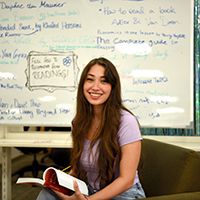
Telecommunications Regulatory Authority (TRA)
Bloomberg
Crescent Petroleum
Ministry of Education
Kitopi
Sharjah Private Education Authority
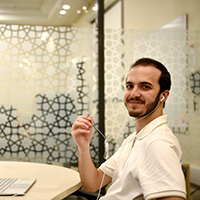
Sharjah Art Foundation
American University of Sharjah
Boeing
Johnson and Johnson
Informa Middle East
Abu Dhabi Music and Arts Foundation (ADMAF)
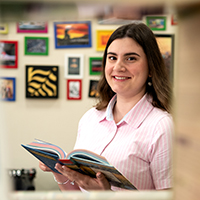
Brunswick
Lifogrowth Education Services
Higher Colleges of Technology
Kuwait Oil Tanker Company
Al Tamimi & Company
Al Arabiya English (MBC Group)
Events and Extracurricular Activities
The Department of English sponsors a number of curricular and co-curricular activities throughout the year, encouraging community building and student success
These events include Open Mic Night where students and faculty share their poetic and musical talents, and the “Shakespeare for Today” series, where students present their thoughts on how the “Immortal Bard” continues to be relevant in our contemporary world. We also host the Senior and MA Thesis presentation days where our BA and MA students present their culminating work to the university, the Sharakah-supported TESOL Days Conference for high school instructors from across the UAE and the seniors’ celebration dinner, where students, friends and faculty come together to honor our graduating students.
We also host a Sharakah sponsored MA TESOL Seminar. Learn more about our latest seminar here.
Extracurricular Activities
- Fellows Program
In addition to the numerous clubs run by students on campus, including the Creative Writing Club, the Department of English runs its very own Fellows Program. This is an extracurricular honorary position where the fellows take on several responsibilities to enhance the environment, community, culture and academic life of the department. It is an invaluable learning experience, honing students’ organizational, communication and leadership skills.
Fellows are introduced to the processes of peer-review and web design, and serve as liaisons between students and faculty, among other activities. They also organize department events such as the annual Open Mic Night, and produce the online journal Asrar: Dialogues from the Diaspora.
For updates on the latest news and events organized by the Fellows Program, follow them on Instagram.
- Asrar: Dialogues From The Diaspora
First launched in Spring 2014, Asrar is an online journal run by students in the Department of English. Asrar publishes works of nonfiction/criticism, creative writing, and additional media created by students from various disciplines. Read the latest issue here.
Spotlight
Contact Us
Department of English
College of Arts and Sciences
American University of Sharjah
PO Box 26666
Sharjah, UAE
Interim Department Head
Dr. Kristen Highland
Tel +971 6 515 4438
[email protected]
Administrative Assistant
Hadeel El-Rahal
Tel +971 6 515 2374
Fax +971 6 515 2598
[email protected]
For admission information, please visit https://infodesk.aus.edu, sign up and post your query.

